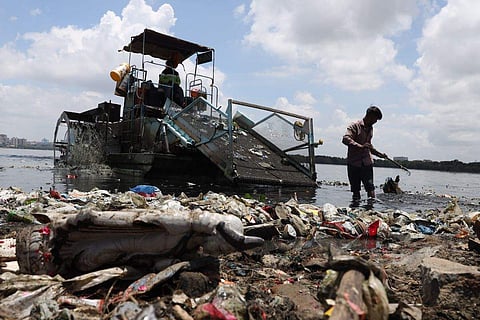
- LIFESTYLE
- FASHION
- FOOD
- ENTERTAINMENT
- EVENTS
- CULTURE
- VIDEOS
- WEB STORIES
- GALLERIES
- GADGETS
- CAR & BIKE
- SOCIETY
- TRAVEL
- NORTH EAST
- INDULGE CONNECT

As someone who tries to cover the problems a city faces on an everyday basis, from an onlooker’s point of view, the problem of garbage seems to be a problem of attitudes, a problem of lack of awareness and a lack of willingness to take responsibility for one’s city. We might think taking advantage of a city’s resources is equal to taking ownership of it, but a look at Tank Bund reminds us that people who come to celebrate birthdays and moments of togetherness, do not really take into account the physical space that they ‘use’ for such celebrations. Coming to think of it, how many of us take ownership of our own homes? To be more specific, of the waste that each one of us generates in our homes. Do we know who takes care of it? Mothers? Domestic Workers?
Raju, a Swachh Auto Tipper who collects dry waste from around 300 houses in Secunderabad, says that the dry waste he collects comprises vegetable waste, dry leaves, paper, plastic, electrical items, glass and other things. He makes two trips to the Secondary Collection and Transfer Point (SCTP) at Tank Bund where he deposits all the waste, to be carried in another vehicle to Jawaharnagar for processing. The said SCTP holds waste from four areas: Amberpet, Musheerabad, Begumpet and Secunderabad. In Jawaharnagar, all the mixed waste is received from all circles and is segregated as wet and dry at its Processing and Disposal facility.
According to a study conducted by NEERI (National Environmental Engineering Research Institute) in 2018, Hyderabad is the highest per capita waste-producing city, with 0.57 kg of waste being generated per person every day. In a research paper written by Kalpana Markandey from Osmania University, there are variations among localities depending on the family size, location, socio-economic characteristics, monthly income etc.
While trying to make the heads and tails of this massive issue of garbage management, one cannot help but see the complexities that arise at each stage, right from collection, segregation, and processing to the reuse and recycling of waste. Each stage gives in a web of issues pertaining not only to the attitudes and behaviours of individuals and institutions but also to the infrastructure and services available.
Attitudinal problem?
“Individual behaviour, I think, is a cultural thing. It should come from the upbringing of every child as learning from parents. Usually at the household level, when we see the behaviour of parents who sometimes throw all the garbage in the open plot or some other place in the immediate neighbourhood, it doesn’t set a good example for kids. Even within the school also, the teacher should make it mandatory for every child not to throw even the smallest paper or even a chocolate wrapper anywhere other than a dustbin,” said environment author, Sai Bhaskar Reddy.
“In Japan, the students are encouraged to clean toilets also, it is part of school education. But here, parents consider any waste management activity that children are involved in as something wrong,” he added. Reddy also added that at times, the installation of cameras also helps in making citizens accountable for their actions.
“But why is there a need to throw? That is a fundamental question,” he asks.
Do we even know where to begin?
On one hand, there is a stark reality of garbage generation and the problem of its management hitting us in the face and on the other, the inability to even conceptualise how to tackle the issue. For experts like Reddy, the solutions begin at home, with each individual taking the responsibility to manage their own waste. “First, the concept of refusing, reducing, reusing, repairing, recycling, all the five ‘Rs’ must be known. Secondly, the weight generated by each person should be charged according to its weight. So far, we are only paying minimal amounts to the person who comes to collect the waste from our homes, but a weight-based charge would encourage people to reduce it also,” he said.
“Thirdly, I think every household should have a compost bin by default. All the compostable things should get into nature. There are methods in which they can be done without all the smell. There are models that can be adopted, including for food waste generated from canteens, hotels, or community places,” he added.
In an eye-opening conversation, Anant Maringanti from Hyderabad Urban Lab questioned, “With each household, street and locality generating waste according to its own mechanisms, do you think one solution would work for all? Even for segregated waste, people are using plastic bags. Is the government willing to pay for free bio-degradable bags?”
With associated issues of caste and gender, cleaning one’s surroundings is one of the most complex issues we are grappling with. “The solutions need to be thought through in a decentralised manner. You have to come up with circlewise plans for decentralised waste management and circlewise implementation of garbage rules,” Maringanti concluded.